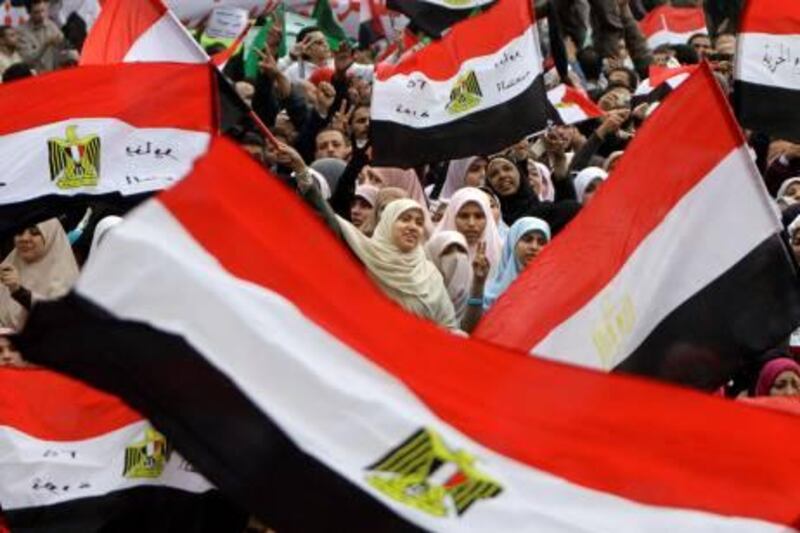CAIRO // Tens of thousands of Egyptians, mostly Islamists, rallied yesterday in Tahrir Square to protest against what they say are military rulers' attempts to prevent any civilian government from exerting control over them.
It was one of the largest rallies in Egypt in recent months. Most rallies in Tahrir have been led by liberal- or left-leaning groups. But yesterday's rally was dominated by the country's most organised political group, the Muslim Brotherhood.
The protesters poured into the square for prayers, speeches, poems and music in a show of strength ahead the November 28 parliamentary elections.
The Brotherhood and several liberal and secular groups had called for the rally to oppose military influence over a new constitution to be drafted after the elections.
"We came here today to demand the government move from military to civilian rule," said Ismaa Uslan, 21, a veiled university student. "The military is always sticking its nose in everything. They are corrupt."
This month, the military-run government announced so-called "supra-constitutional" principles, some of which critics say shield the army from any parliamentary oversight.
The military seized control during the February revolt that toppled the former president Hosni Mubarak. They installed the Supreme Council of Armed Forces (Scaf) - a coterie of generals - to oversee transition to democratic rule.
But since then, the army has consolidated its power, and the generals have fallen afoul of the political groups that supported the revolt.
"If Scaf does not resolve this issue before the elections, there will be a catastrophe," said Amer Al Mousilhi, 38, a Brotherhood organiser from the Dakahlia governorate. "We will stay here in Tahrir until the guidelines are changed."
Banners at the protest read: "Down with military rule. Egypt our country is not a military camp." Some demonstrators flew the Egyptian flag, while others including ultraconservative Salafis waved a banner declaring the Quran to be "our constitution."
By nightfall, the crowds were mostly gone from the square, but some had pitched tents and vowed to stay until their demands were met.
Earlier, some activists spilled out of the square and into the streets and alleyways of downtown Cairo.
The crowd, waving Egyptian Brotherhood and Islamic flags, chanted: "Scaf should leave. We are not leaving."
The rally was viewed as a success for the Brotherhood and the Salafis looking to flex their political muscles as campaigns heat up for the country's first post-uprising legislative elections to be held this month.
Until recently, the Brotherhood had avoided confrontation with Scaf and was even happy to strike deals with the military to allow it a bit of political breathing room, analysts say.
Under Hosni Mubarak, the Brotherhood was banned but tolerated. Islamists are expected to win the majority of seats in parliament.
When Scaf first came to power, the military was unable to provide security, particularly in rural areas, said Joshua Stacher, professor of Middle East and Egyptian politics at Kent State University in the United States.
"They needed to reach out and have somebody that could help establish order. The Brotherhood became that engine," he said. "They kept people policed and self-policed - in exchange for some political representation."
In addition, other Islamist groups such as Hizb Al Nour (Party of Light) - a Salafi party fielding candidates - and Islamic Jihad, a militant organisation once aligned with Al Qaeda, held smaller side rallies with their own supporters.
"We came to lead the way in showing people the true Islam, the true religion," said Sheikh Adel Shehato, senior leader of Islamic Jihad who helped organise jihadists in Afghanistan in the 1980s.
"We are fighting for Ayman, and for bin Laden," Sheikh Shehato said, in reference to Osama bin Laden and his Egyptian deputy, Ayman Zawahiri.
Elsewhere, the Salafist Hizb Al Nour rallied supporters around its small stage with rousing speeches from party clerics and calls for social and constitutional justice.
Many Salafi movements across the Muslim world denounce elections as un-Islamic.
"It's like if a person was lost in the desert, and he is very hungry," Ahmed Amlawi, 38, a follower of Hizb Al Nour, explained his party's decision to participate in elections. "He finds a dead animal. In Islam, it is forbidden to eat dead animals. But he needs to survive. That is us right now."
While liberal and secular parties also attended the rally, their presence was much weaker than their Islamist counterparts.
Liberal activists marched from various points around the city to Tahrir Square in the afternoon, and joined other protests against military trials and an intensifying Scaf crackdown on bloggers.
Ahmed Said, 25, from a coalition of socialist activists, said the high numbers of Islamists did not alarm him. It was all part of Egypt's new democratic experiment, he said.
"It's our freedom now - to express, to choose, to say what we want," he said. "We try to make our voice heard. But the most important thing is that we have the right to do it."
foreign.desk@thenational.ae






